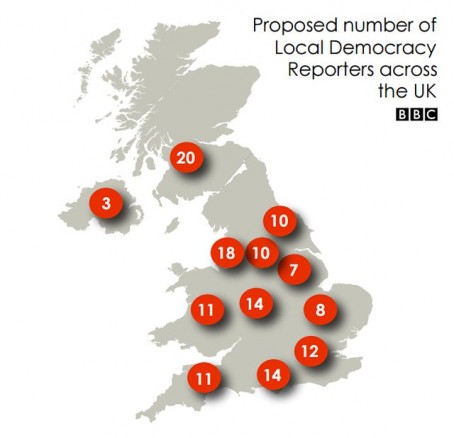The much-vaunted local democracy reporting partnership between the regional press and the BBC is set to open to applications from publishers next week.
The corporation has announced applications for the scheme, which will see 150 taxpayer-funded public service reporters recruited across the UK, will open next Monday (15th May) and close a fortnight later.
The partnership with the News Media Association will see the journalists employed by news organisations to cover councils and other public bodies from this summer.
The BBC will invest up to £8m a year in the partnership for the next 11 years, while the first of the new reporters are expected to be recruited in the West and North-West of England this autumn.
As well as the local democracy reporters, the project also includes the creation of a news hub giving external media organisations access to BBC video and audio material for use online, and a shared data unit which will be staffed by reporters from local news providers and the BBC.
David Holdsworth, controller of BBC English Regions, said: “This is an exciting moment in the development of our partnership with the local news industry. We’re at a stage now where our ideas are close to becoming a reality.
“The BBC has made a big commitment to this project because we want to play our part in making sure decisions that affect the lives of our audiences are given appropriate journalistic attention.
“By working collaboratively and cooperatively with the local news industry we believe we can do that more effectively in communities across the country.”
A total of 54 contracts are up for grabs following a proposal in February which revealed provisionally how many journalists will cover each geographic area – with a total of 138 recruited initially.
Scotland will receive 20 reporters split equally into groups of four across five different regions, while three will cover the whole of Northern Ireland and 11 are allocated to Wales.
In the North of England, the North-West will get 18, the North-East and Yorkshire get 10 apiece, 14 will cover the West Midlands, while the East Midlands gets half that number.
The South-East, excluding London, gets 14, while the capital itself will receive 12 and the South-West gets 11.
Eight journalists will cover the East, half of which will be allocated to Cambridgeshire, Hertfordshire and Bedfordshire, while the other four will be split equally between Essex and East Anglia.
The only two patches to be covered by one reporter apiece are Derbyshire, in the East Midlands region, and the Isle of Man, which is counted as part of the North-West.


 Follow HTFP on Twitter
Follow HTFP on Twitter
Seems like more redundancies on the horizon
Report this comment
Oh great, when this was first mooted I thought it’d fall under the BBC, but now it looks like it’s going to be a jobs for the boys setup with the usual suspects where nobody over 30 gets a gig, wonderful news.
Report this comment
I’d be interested to know what’s to stop editors applying to this scheme, then laying off political staff/encouraging their political staff to go for it then not replace them. If it this isn’t the immediate effect – presumably there is some kind of safeguard – what’s to stop them doing this in the long-term when they realise they can get content for free?
I’m all for increased scrutiny of the democratic process – we all know it’s needed as there is certainly a void – but it’s hard to trust profit-motivated publishers with licence fee payers’ money.
Report this comment